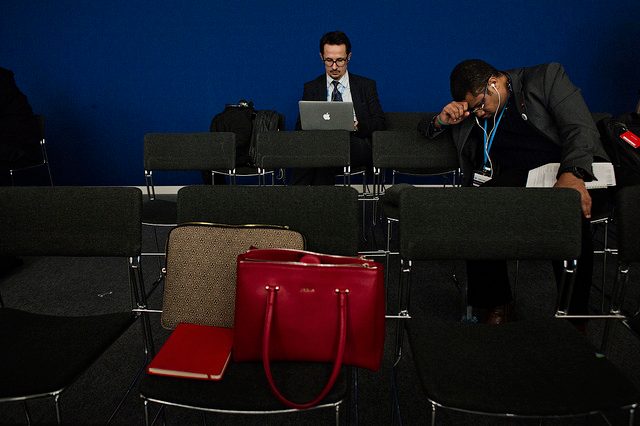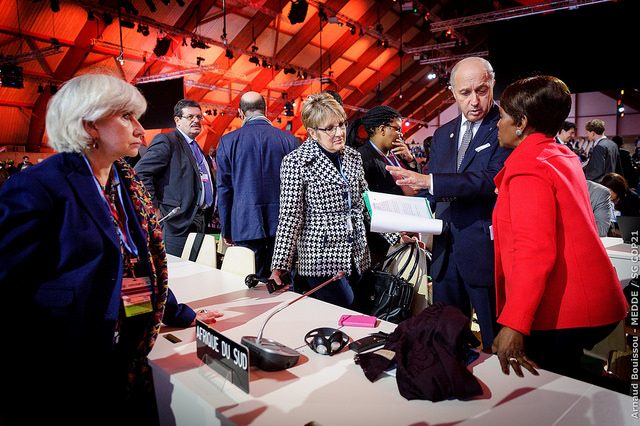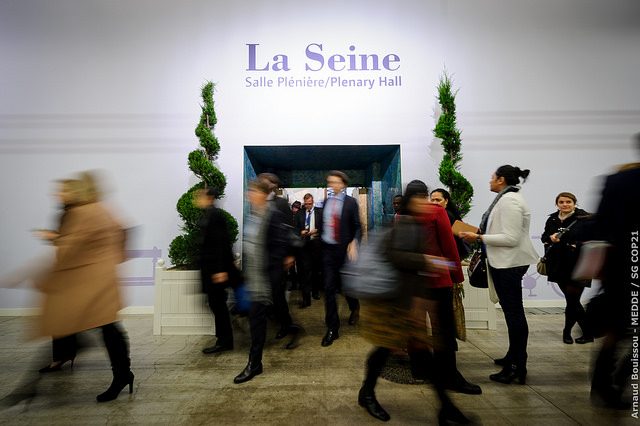SUMMARY
This is AI generated summarization, which may have errors. For context, always refer to the full article.

LE BOURGET, France – Climate negotiations go into overdrive Thursday, December 10, as diplomats and negotiators at the UN climate change summit (COP21) argue over what goes in or out of the potentially historic deal that could spell our planet’s survival.
Meetings and discussions continued Thursday at the Le Bourget conference site, despite Wednesday’s (December 9) meetings ending nearly at daybreak, as the clock ticks towards the Friday, December 11 deadline – and what scientists say also a deadline for humanity to deal with climate disruption once and for all.
The Philippine delegation told Filipino journalists here that most consultation meetings ended at around 5 am Central European time (12 noon Philippine time), after starting early evening Wednesday.
The all-nighter meetings and consultations came after host nation France released a 29-page draft agreement that French Foreign Minister Laurent Fabius said showed “emerging compromises” among countries on the way to a legally-binding and universal agreement.
The conference in Le Bourget, at the outskirts of the French capital, aims to produce the Paris agreement, which will target to limit greenhouse gas emissions and limit global warming to below 2 degrees Celsius (3.6 degrees Fahrenheit).
A fresh draft of the agreement is expected to be produced Thursday, which the negotiators from 195 delegations will again pore through and debate over.
Many sticking points remain, French President Francois Hollande said, as the host country pushes to end the conference with a substantial pact by Friday, December 11.
“There are still difficulties, we are aware of them, on financing… There is also some resistance, particularly in relation to compensation for (climate-inflicted) loss and damage,” Hollande said.
“We also need to ensure the commitments are not too far into the future,” he said, referring to pledges that would address climate change in the near-term.
“It is important in this last phase that we remind the negotiators why they are here,” Hollande said.
“They are not there simply in the name of their countries… they are there to sort out the issue of the future of the planet,” he added.
Tense yet upbeat

Delegates said, though, that the mood was still positive, and the toxic ambience of past climate talks had so far been absent.
Developing nations insist the United States and other established economic powerhouses must shoulder the lion’s share of responsibility as they have emitted most of the greenhouse gases since the Industrial Revolution.
Rich nations argue emerging giants must also do more. Developing countries now account for most of today’s emissions and thus will stoke tomorrow’s warming.
The Philippines, specifically, is fighting to have the following major points included in the final draft:
- Global warming to be limited to 1.5ºC
- Human rights be included as a “bedrock” of the pact
- An exact amount of money that developing countries will provide to poor, vulnerable nations to help combat the effects of climate change
- The concept of loss and damage
(READ: COP21: 4 crucial things PH wants from the UN climate deal)
“I feel so optimistic that a decision will come out at 7 o’clock tonight where our advocacy for the 1.5ºC limit will be written there. I feel so optimistic,” said Albert Magalang, Philippine negotiator and head of the Climate Change Office under the Department of Environment and Natural Resources.
“What I’m feeling right now is we’ve got all the support mostly from the developing countries, LDCs as well as Small Island States to push for the 1.5ºC limit so I think the parties will really fight for that in the negotiation table,” Magalang said.
Wednesday’s draft agreement was a sign of progress – from 43 pages, the document was pared down to 29 pages, and Fabius said it has reduced the number of bracketed text by 3/4 the previous number.
Bracketed parts of the document are words or phrases that the parties have yet to agree upon – and these are in danger of being excised altogether in the final document.
Determined to finish on time

Despite the hurdles, negotiators and long-time observers said a deal could be reached in Paris.
“There is a lot of hard work, long hours to go,” Elina Bardram, head of the European Union’s climate delegation, said on Thursday.
“But I remain very confident that political determination will also be projected into the negotiation rooms and that we will end with a very solid… agreement.”
Green groups are worried the outcome may end up so compromised that it will not do nearly enough to tame global warming.
Previous UN climate conferences have extended well past their scheduled finishing times, meaning talks could go into the weekend.
But Fabius has said he is determined for the Paris talks, which began on November 30 with a record-breaking summit of 150 world leaders, to end on Friday.
“I hope, I hope that tomorrow we will have finished,” Fabius said. – With reports from Pia Ranada and Agence France-Presse / Rappler.com
Add a comment
How does this make you feel?
There are no comments yet. Add your comment to start the conversation.